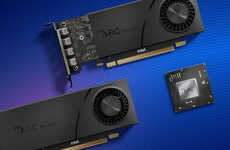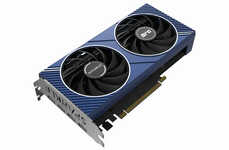
Intel Revealed Its First Ever Discrete Graphics Card at CES 2020
Daniel Johnson — January 10, 2020 — Tech
Intel revealed its first-ever discrete graphics card at CES 2020, which the company titled the 'DG1.' Currently, Intel has not announced any plans of offering its discrete graphics card to consumers, however, creating the graphics card allows the company to develop the technology for potential future products like the 'XeGPU' line.
Intel is now sending the graphics card to various software developers, who will work towards optimizing the device. Overall Intel's venture into discrete graphics cards takes the company into a new direction. The technology could help the company improve the efficiency, as well as the performance, of its graphics cards.
Often times high performing graphics cards are used for PC gaming, which means Intel could be attempting to entice gaming-focused consumers.
Image Credit: Intel
Intel is now sending the graphics card to various software developers, who will work towards optimizing the device. Overall Intel's venture into discrete graphics cards takes the company into a new direction. The technology could help the company improve the efficiency, as well as the performance, of its graphics cards.
Often times high performing graphics cards are used for PC gaming, which means Intel could be attempting to entice gaming-focused consumers.
Image Credit: Intel
Trend Themes
1. Discrete Graphics Cards - The rise of discrete graphics cards presents an opportunity for companies to develop high-performance graphics solutions for various industries.
2. Xegpu Technology - The development of XeGPU technology opens up new possibilities for innovative graphics solutions in industries such as gaming, virtual reality, and design.
3. Optimized Software Development - The need for optimized software for discrete graphics cards creates opportunities for developers to create efficient and high-performance applications.
Industry Implications
1. Gaming - The gaming industry can benefit from the disruptive innovation of discrete graphics cards, allowing for more advanced and immersive gaming experiences.
2. Virtual Reality - Discrete graphics cards offer improved graphics processing power, enabling the virtual reality industry to deliver more realistic and immersive virtual environments.
3. Design - The integration of discrete graphics cards in design industries enables faster rendering and enhanced visualizations, leading to more efficient and creative design processes.
1
Score
Popularity
Activity
Freshness























